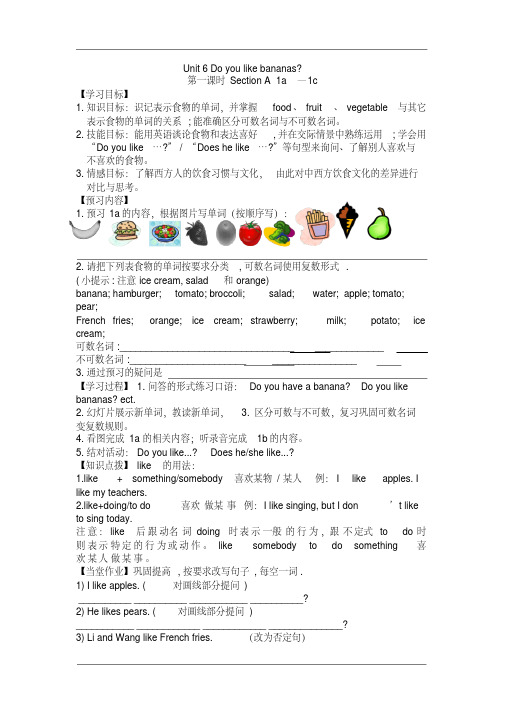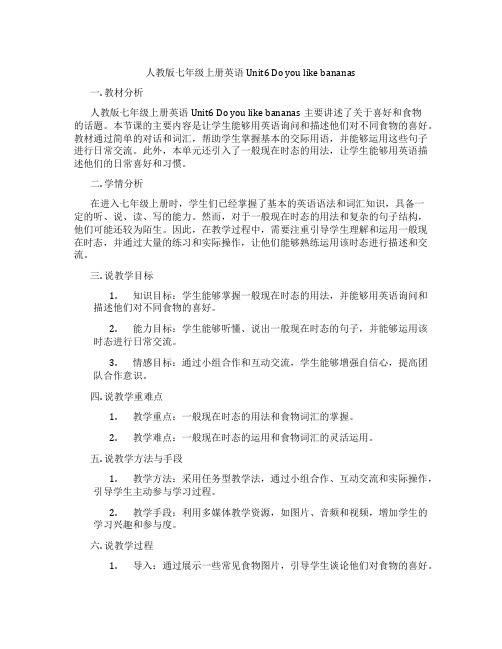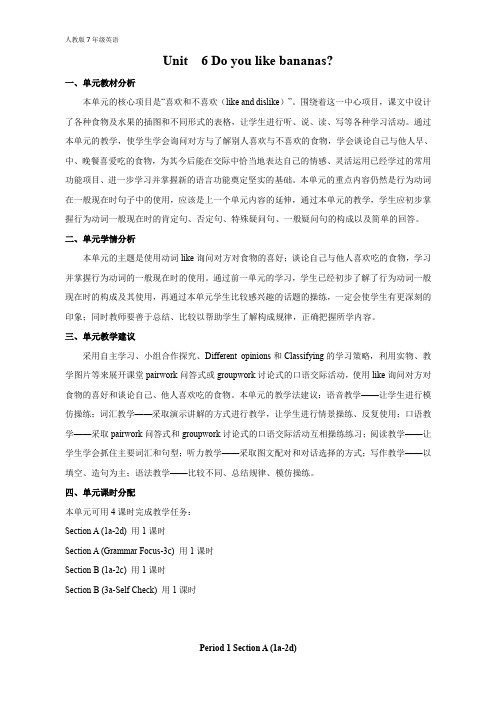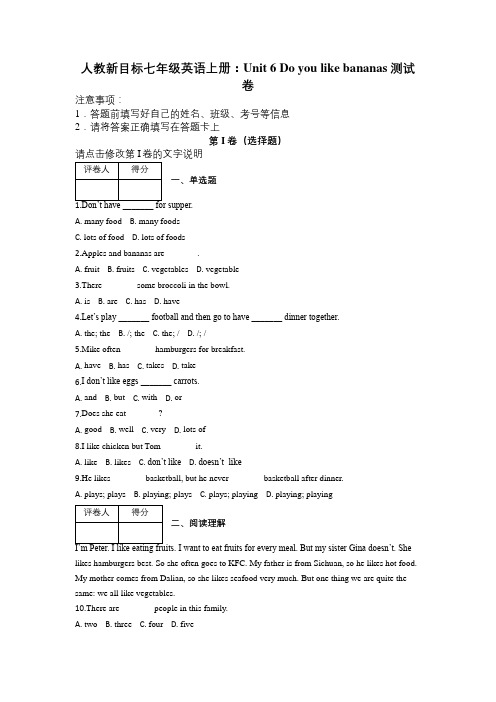2017秋人教新目标版七年级英语上册Unit6DoyoulikebananasPeriod3导学案(无答案)
新目标英语七年级上册Unit6_Do_you_like_bananas课标解析

新目标英语七年级上册Unit6 Do you like bananas?课标解析
许晏菱初2014级
教材分析
本单元的主题是教会学生在日常生活中养成健康饮食的习惯。
整个单元以食物名词为主题,以一般现在时的like进行对话为途径,从听说读写等方面开展学习任务。
语法的重点是行为动词的一般现在时。
由于课文以对话展现,学生很容易地把生活中的情景和书上的对话以及文段比较自然地联合起来。
本单元的中心话题是Food,主要语言功能项目是Talk about likes and dislikes.当主语是第三人称单数时句型的变化以及回答是本单元的语法重点。
在第五单元学生已经对do and does 有了一定的认识。
本单元主要句型:Do you like…? 及其回答Yes, I do. / No, I don’t.学生就容易理解。
综上所述,本单元以食物为主线,围绕着谈论喜欢与不喜欢以及一日三餐等语言功能项目展开了一系列任务活动。
要求学生能够用英语写一篇介绍自己家人喜欢和不喜欢的食物,养成健康饮食的习惯。
单元教学安排
本单元分为5个课时,分别是sectionA两课时,sectionB两课时,一课时阅读课。
单元目标
课时目标
思想情感目标:
1)通过学习文章,学会养成健康饮食的习惯。
2)学习养成节约粮食,爱惜食物的品质。
能力发展目标:
1)能掌握书面表达的基本写法。
2)能正确使用可数名词和不可数名词。
3)能掌握一般现在时的结构、意义和用法。
人教版七年级上册英语讲义 Unit 6 Do you like bananas

Unit 6 Do you like bananas? 讲义一、【重点单词】banana /bə'nɑ:nə/香蕉hamburger /'hæmbɜ:(r)ɡə(r)/汉堡包tomato /tə'mɑ:təʊ/西红柿ice-cream /,aɪs'kri:m/冰激凌salad /'sæləd/沙拉strawberry /'strɔ:berɪ/草莓pear /peə(r)/梨milk /mɪlk/牛奶bread /bred/面包birthday /'bɜ:(r)θdeɪ/生日dinner /'dɪnə(r)/(中午或晚上吃的)正餐week /wi:k/周;星期food /fu:d/食物sure /ʃʊə(r)/当然;肯定;一定burger /'bɜ:(r)ɡə(r)/汉堡包= hamburgervegetable /'veʤtəbəl/蔬菜fruit /fru:t/水果right /raɪt/正确的;适当的apple /'æpl/苹果then /ðen/那么egg /eɡ/蛋;鸡蛋carrot /'kærət/胡萝卜rice /raɪs/大米;米饭chicken /'ʧɪkɪn/ji鸡肉so /səʊ/ (引出评论或问题)那么breakfast /'brekfəst/早餐;早饭lunch /lʌnʧ/午餐star /stɑ:(r)/明星;星星eat /i:t/吃well /wel/好;令人满意的habit /'hæbɪt/习惯healthy /'helθi/健康的really /'ri:əli/真正地question /'kwesʧən/问题want /wɒnt/需要;想要be /bi:/变成fat /fæt/肥的;肥胖的二、【重点短语】1. John ’s birthday dinner 约翰的生日宴会2. vegetable salad 蔬菜沙拉3. two tomatoes 两个西红柿4. eat well 吃得营养5. think about 考虑6. eat/have breakfast/lunch/dinner 吃早/午/晚饭7. sports stars 体育明星8. the volleyball star 排球明星9. ask sb. about sth. 问某人某事10. like hamburgers/ice-cream 喜欢汉堡包/冰淇淋11. like eating eggs 喜欢吃鸡蛋12. her eating habits 她的饮食习惯13. be (not) healthy (不)健康14. one last question 最后一个问题15. healthy food 健康食物16. after breakfast/lunch/dinner 早/午/晚饭后17.one last question 最后一个问题18.some fruit 一些水果19.for dinner 作为晚餐20.how about 怎么样三、【重点句型】1.—Do you like salad? 你喜欢沙拉吗?一Yes,I do. /No, I don’t. 是的,我喜欢。
人教新目标英语七上Unit6Doyoulikebananas教案4

Unit 6 Do you like bananas?第一课时Section A 1a—1c【学习目标】1.知识目标:识记表示食物的单词,并掌握food、 fruit、 vegetable与其它表示食物的单词的关系;能准确区分可数名词与不可数名词。
2.技能目标:能用英语谈论食物和表达喜好,并在交际情景中熟练运用;学会用“Do you like…?” /“Does he like…?”等句型来询问、了解别人喜欢与不喜欢的食物。
3.情感目标:了解西方人的饮食习惯与文化,由此对中西方饮食文化的差异进行对比与思考。
【预习内容】1.预习1a的内容,根据图片写单词(按顺序写):2.请把下列表食物的单词按要求分类,可数名词使用复数形式.(小提示:注意ice cream, salad和orange)banana; hamburger; tomato; broccoli; salad; water; apple; tomato; pear;French fries; orange; ice cream; strawberry; milk; potato; ice cream;可数名词:_________________________________ _____________不可数名词:______________________ ________________3.通过预习的疑问是【学习过程】1.问答的形式练习口语:Do you have a banana? Do you like bananas? ect.2.幻灯片展示新单词,教读新单词,3.区分可数与不可数,复习巩固可数名词变复数规则。
4.看图完成1a的相关内容;听录音完成1b的内容。
5.结对活动:Do you like...? Does he/she like...?【知识点拨】like 的用法:1.like + something/somebody 喜欢某物/某人例:I like apples. I like my teachers.2.like+doing/to do喜欢做某事例:I like singing, but I don’t like to sing today.注意:like后跟动名词doing时表示一般的行为,跟不定式to do时则表示特定的行为或动作。
人教版七年级上册英语Unit6Doyoulikebananas

人教版七年级上册英语Unit6 Do you like bananas一. 教材分析人教版七年级上册英语Unit6 Do you like bananas主要讲述了关于喜好和食物的话题。
本节课的主要内容是让学生能够用英语询问和描述他们对不同食物的喜好。
教材通过简单的对话和词汇,帮助学生掌握基本的交际用语,并能够运用这些句子进行日常交流。
此外,本单元还引入了一般现在时态的用法,让学生能够用英语描述他们的日常喜好和习惯。
二. 学情分析在进入七年级上册时,学生们已经掌握了基本的英语语法和词汇知识,具备一定的听、说、读、写的能力。
然而,对于一般现在时态的用法和复杂的句子结构,他们可能还较为陌生。
因此,在教学过程中,需要注重引导学生理解和运用一般现在时态,并通过大量的练习和实际操作,让他们能够熟练运用该时态进行描述和交流。
三. 说教学目标1.知识目标:学生能够掌握一般现在时态的用法,并能够用英语询问和描述他们对不同食物的喜好。
2.能力目标:学生能够听懂、说出一般现在时态的句子,并能够运用该时态进行日常交流。
3.情感目标:通过小组合作和互动交流,学生能够增强自信心,提高团队合作意识。
四. 说教学重难点1.教学重点:一般现在时态的用法和食物词汇的掌握。
2.教学难点:一般现在时态的运用和食物词汇的灵活运用。
五. 说教学方法与手段1.教学方法:采用任务型教学法,通过小组合作、互动交流和实际操作,引导学生主动参与学习过程。
2.教学手段:利用多媒体教学资源,如图片、音频和视频,增加学生的学习兴趣和参与度。
六. 说教学过程1.导入:通过展示一些常见食物图片,引导学生谈论他们对食物的喜好。
2.新课呈现:引入一般现在时态的概念,并通过示例句子让学生理解一般现在时态的用法。
3.对话练习:让学生听录音或观看视频,模仿对话中的句子,并进行角色扮演。
4.小组活动:学生分组进行讨论,用英语询问和描述他们对食物的喜好。
5.巩固练习:通过完成练习题和互动游戏,让学生进一步巩固一般现在时态的用法。
人教版英语七年级上册 Unit 6 Do you like bananas

This is a fruit and vegetable house (果疏屋). What’s in the house? (果蔬屋里有什么?)
some vegetables
some fruits
banana bananas
pear pears
strawberry strawberries
2 A: Do you like salad? B: No, I don’t.
1 A: Do you like bananas? B: Yes, I do.
3 A: Do you like oranges? B: Yes, I do.
Post-listening
1c Practice the conversations with your partner. Then make your own conversations.
2. tomatoes __i _ 3. oranges _f__ 4. ice-cream _h__ 5. salad __b_ 6. bananas _g__
7. strawberries __c_ 8. pears __j_
9. milk __e_ 10. bread _a__
Read the dialogue in the picture.
Read the conversation after the tape.
1. Girl: I like hamburgers. Do you like hamburgers? Boy: Yes, I do.
2. Girl: Do you like tomatoes? Boy: No, I don't like tomatoes.
—Do you like bananas? —Yes, I do. —Do you like salad? —No, I don’t. —Do you like oranges? —Yes, I do.
人教版新目标七年级上Unit 6Unit 6 Do you like bananas Lesson

Unit 6 Do you like bananas?Second Period (Section A, 2d –3c)Teaching aims and language points:1. Learn these words and be able to say, read and write them:● birthday, dinner, week, think about, food, sure, how about, burger, right, then, rice, so 2. Be able to talk about what to eat for a meal by using:● John ’s birthday dinner is next week. ● Let’s talk about the food. ● How/What about …? ● You’re right.3. Consolidate the pronunciation and spelling of key vocabulary.4. Be able to understand the main differences between countable and uncountable nouns.Teaching steps:1. Warm-up and revision (课堂热身和复习) (1)Daily greeting to the students (日常问候) (2)Revision (复习):Look at the pictures, and say and spell the words. Teach three new words: burger, milk, food. (3)Work on 3b.First, Ss read and number the conversation. Next, Ss discuss what the word “so ” means in the conversation. Finally, Ss make up their own conversations in pairs.2. Work on 2d(1) Ss read the conversations by themselves and circle the food in it. (2) Ss role-play the conversation in groups of three. (3) Answer some questions about the conversation. (4) Read the conversation again. Try to understand the conversation better and pay attention to some key sentences. 3. Study the grammar (学习语法)(1) Ss complete the exercise in 3a by themselves. (2) Ss work in groups to check their answers. (3) Get the Ss to discuss two questions.(4) Read Grammar Focus and answer the questions. 4. Chant (吟诵)Join us, join us. Let’s have a party. Do you like salad? Yes, I do.2. 通过自己阅读,分角色阅读对话,使学生理解对话的发生的情景和句意。
英语七年级上册Unit6Doyoulikebananas人教版七年级上unit6课件

I couldn’t think of the name of that man. 我想不出那人的名字来了。
Let’s think of some questions about life. 让我们对生活设想一些问题吧。
4. sure adv. (副词)当然;肯定;一定 常用来回答一般疑问句,意为“当然; 的确”,相当于yes或certainly。只是 sure 在英国英语中较为常用,而在美国 英语中常用certainly。
Jack: Hey, John’s birthday dinner is next week.
Let’s think about the food.
Tom: Sure. How about burgers, vegetable salad,
and some fruit?
2d
Bill: Sounds good. John likes hamburgers.
last week 上礼拜
this week 本周
next week 下周
3. think about 思考,思索
(一般是短时间的较仔细的考虑) What do you think about that? 你认为怎么样? I’ll have to think about it. 我得想一想。
think of 想到;想象;设想 多用来指“想起,认为”。
Countable nouns Uncount- Countable and
able uncountable
nouns nouns
hamburgers, e_g_g_s milk _o_r_a_n_g_e_s__a_p__p_le_s_ bread _b_a_n_a_n__a_s__p_e_a_r_s_ rice _ca_r_r_o_t_s__t_o_m_a__to_e_s _v_e_g_e_t_a_b_le_s______
人教版新目标英语七年级上册 Unit 6 教案(共计17页)

Unit 6 Do you like bananas?一、单元教材分析本单元的核心项目是“喜欢和不喜欢(like and dislike)”。
围绕着这一中心项目,课文中设计了各种食物及水果的插图和不同形式的表格,让学生进行听、说、读、写等各种学习活动。
通过本单元的教学,使学生学会询问对方与了解别人喜欢与不喜欢的食物,学会谈论自己与他人早、中、晚餐喜爱吃的食物,为其今后能在交际中恰当地表达自己的情感、灵活运用已经学过的常用功能项目、进一步学习并掌握新的语言功能奠定坚实的基础。
本单元的重点内容仍然是行为动词在一般现在时句子中的使用,应该是上一个单元内容的延伸,通过本单元的教学,学生应初步掌握行为动词一般现在时的肯定句、否定句、特殊疑问句、一般疑问句的构成以及简单的回答。
二、单元学情分析本单元的主题是使用动词like询问对方对食物的喜好;谈论自己与他人喜欢吃的食物,学习并掌握行为动词的一般现在时的使用。
通过前一单元的学习,学生已经初步了解了行为动词一般现在时的构成及其使用,再通过本单元学生比较感兴趣的话题的操练,一定会使学生有更深刻的印象;同时教师要善于总结、比较以帮助学生了解构成规律,正确把握所学内容。
三、单元教学建议采用自主学习、小组合作探究、Different opinions和Classifying的学习策略,利用实物、教学图片等来展开课堂pairwork问答式或groupwork讨论式的口语交际活动,使用like询问对方对食物的喜好和谈论自己、他人喜欢吃的食物。
本单元的教学法建议:语音教学——让学生进行模仿操练;词汇教学——采取演示讲解的方式进行教学,让学生进行情景操练、反复使用;口语教学——采取pairwork问答式和groupwork讨论式的口语交际活动互相操练练习;阅读教学——让学生学会抓住主要词汇和句型;听力教学——采取图文配对和对话选择的方式;写作教学——以填空、造句为主;语法教学——比较不同、总结规律、模仿操练。
新目标英语七年级上册unit6知识点

专业资料整理 Unit6Doyoulikebananas?1.单词分类(1)表水果(fruit ):banana,orange,pear,strawberry,apple(2)表蔬菜(vegetable ):tomato,broccoli,carrot(3)表食物(food ):Frenchfries,hamburger,egg,chicken,dessert(4)三餐:breakfast,lunch,dinner.2.likev.喜欢(1)likesb./sth.喜欢某人/某物,后面跟名词或代词IlikeEnglish.我喜欢英语。
Theyalllikehim.他们都喜欢他。
(2)liketodosth./likedoingsth.喜欢做某事Shelikesswimming.她喜欢游泳。
Shelikestoswim.她喜欢游泳。
(3)prep.像⋯⋯一样。
Don ’ttalklikethat.不要那样说话。
H elookslikehisfather.他看起来像他的父亲。
3.howabout =whatabout+doing/n?(1)表示询问⋯怎么样? Mylittledogisclever,whataboutyourdog?我的小狗很聪明,你的狗怎么样?(2)表示建议如何⋯⋯好吗?Howaboutacupoftea?喝杯茶好吗?W hataboutplayingfootballnow?现在踢足球好吗?4.fruitn.水果,不可数名词水果总称;指个别水果或种类时,是可数名词。
Bananasandapplesarefruit.香蕉和苹果是水果。
Ilikeeatingdifferentfruits:apples,pearsandbananas.5.orange(1)n.可数名词,橙子Shelikesorangesverymuch.她非常喜欢橙子。
n.不可数名词,橙汁Iwanttohaveacupoforange.我想喝杯橙汁。
七年级英语Unit 6Do you like bananas 人教版(新目标)知识精讲

初一英语Unit 6 Do you like bananas? 人教版(新目标)【本讲教育信息】一. 教学内容:Unit 6 Do you like bananas?(一)语言目标谈论爱好和厌恶。
(二)语言功能学会用英语表达自己喜欢或不喜欢的东西,询问别人是否喜欢,提出建议。
(三)重点句型Do you like bananas? Yes, I do./No, I don’t.I like French fries. I don’t like tomato es.(四)主题词表(五)重点词汇及短语词汇:like, hamburgers, tomatoes, broccoli, French fries, oranges, ice cream, salad, bananas, eggs, carrots, strawberry, apples, chicken, breakfast, lunch, dinner, fruit, vegetable.短语:a lot of like to do sth. like doing sth.(六)语法1. 动词like的用法。
2. 一般疑问句的肯定、否定回答。
3. 名词复数的使用。
(七)重难点分析:1. 可数名词和不可数名词(1)可数名词:①定义:是可以计数的名词。
②可数名词前可以用a,an限定。
③可数名词前可以用one,two,three…限定。
④可数名词有复数形式。
(2)不可数名词:①定义:指不能计数的名词。
②不可数名词前不可以用a,an限定。
③不可数名词前不可以用one,two,three…限定。
④不可数名词没有复数形式。
2. 一般名词的复数形式(1)一般在名词词尾加-s。
如:banana-bananas(2)以-o,-s,-sh,-ch及-x结尾的名词,在词尾加-es构成复数形式。
如:tomato-tomatoes (3)有些以-o结尾的名词仍加-s。
人教新目标英语七年级上册unit6单元知识点总结 练习题

人教新目标英语七年级上册unit6 Do you like bananas?重点词汇:banana n.香蕉hamburger n.汉堡包tomato n.西红柿ice-cream n.冰淇淋salad n.沙拉strawberry n.草莓pear n.梨milk n.牛奶bread n.面包birthday n.生日dinner n.正餐week n.周;星期food n.食物sure adv.当然;肯定;一定vegetable n.蔬菜fruit n.水果right n.正确的;适当的apple n.苹果then adv.那么egg n.蛋;鸡蛋carrot n.胡萝卜rice n. 大米;米饭chicken n.鸡肉so conj.那么breakfast n. 早餐;早饭lunch n.午餐star n.明星;星星eat v.吃well adv.好;令人满意地habit n.习惯healthy adj.健康的really adv.真正地question n.问题want v.需要;想要be v.变成fat adj.肥的;肥胖的、重点词组:think about (doing sth) 考虑what/how about doing sth …..怎么样eat well 吃得好ask sb about sth 问某人关于某事ask sb to do sth 要求某人去做某事be healthy 健康的after breakfast/lunch/dinner 早/中/晚饭后want to do sth 想要做某事eating habits 饮食习惯healthy food 健康食品可数名词和不可数名词的区别:用所给词的适当形式填空。
1.These are pens (pen).2.-I want something to eat.-Here is (be) some bread.3.Here are three photos of my family.4.Lin Tao and Lucy are my friends (friend).2. 可数名词复数的构成单元考点解析:1.能掌握以下句型:①—Do you like salad? —Yes, I do. / No, I don’t.②—Does she/he like …? —Yes, she/he does./ No, she/he doesn’t.③—I like …/I don’t like …④—He/She likes …/ He/She doesn’t like …肯定句:①第一人称/第二人称/第三人称复数+ like + 其他②第三人称单数及其他单数名词+ likes + 其他否定句:①第一人称/第二人称/第三人称复数+ don’t + like + 其他②第三人称单数及其他单数名词+ don’t + likes + 其他一般疑问句:①Do + 第一人称/第二人称/第三人称复数+ like +其他?回答:Yes, I/we/you/they do. No, I/we/you/they don’t.②Does + 第三人称单数及其他单数名词+ like + 其他?回答:Yes, he/she/it does. No, he/she/it doesn’t.2. Let’s have ice-cream. 让我们吃冰淇淋吧。
人教版新目标七年级上Unit 6Unit 6 Do you like bananas Lesson

Unit 6 Do you like bananas?Third Period (Section B, 1a –1e & Self Check)Teaching aims and language points:1. Learn these words and be able to say, read and write them: ● eat, breakfast, lunch2. Be able to talk about what to eat for a meal by using: ● Tom likes/eats carrots for lunch. ● Sally likes/eats eggs for breakfast.3. Consolidate the new words in this unit.4. Consolidate the structures like: ● Does Tom like carrots? ● Yes, he does./No, he doesn ’t.Teaching steps:1.Warm-up and revision (课堂热身和复习) (1)Daily greeting to the students (日常问候) (2)Revision (复习):Check the homework.Ask some of the Ss to read out their reports. Get the other Ss to listen carefully and correct any mistakes in the reports. 2. Presentation (呈现新知识) (1)Work on Section B, 1a.A: These are eggs. It’s number 3.B: Yes, you’re right. (No, I don’t think so. It ’s number …) This is an apple. It’s number 4. Finally, check the answers together. (2)Work on Section B, 1b.Set a timelimit of two minutes. Ask the Ss to discuss the write their answers on their books ,and ask two Ss to write their answers on the board.(3) Work on Section B, 1c(4) Work on Section B, 1d.Listen again and fill in the chart. Ss check their answers in pairs like this:A; Tom likes … and … Tom doesn’t like … or … B: Sally likes … and … Sally doesn’t like … or …(5) Teacher presents the new words :eat, breakfast, lunchT: Every day, we usually eat three meals. In thebreakfast. At about noon, we eat lunch. In the evening, we eat dinner.Ask the Ss these questions:Whose breakfast/lunch/dinner is it? Why?Get the Ss to guess and check their answers.3. Practice(练习)A: Does Tom like carrots?B: Yes, he does. He likes/eats carrots for lunch.(No, he doesn’t. He doesn’t like/eat … for lunch.)4.Work on Self Check, activity 1.5. Read aloud.Practice the pronunciation on p. 74 (Unit 6, activity 2).5. Homework(家庭作业)(1) (Self Check, activity 2) What food, sports and colors do you like and dislike? Write at least three sentences.(2) (Self Check, activity 3) What food, sports and colors do your parents like anddislike? Write at least five sentences.。
人教新目标七年级英语上册:Unit 6 Do you like bananas测试卷及解析

人教新目标七年级英语上册:Unit 6 Do you like bananas测试卷注意事项:1.答题前填写好自己的姓名、班级、考号等信息2.请将答案正确填写在答题卡上第I卷(选择题)一、单选题A. many foodB. many foodsC. lots of foodD. lots of foods2.Apples and bananas are _______.A. fruitB. fruitsC. vegetablesD. vegetable3.There _______ some broccoli in the bowl.A. isB. areC. hasD. have4.Let’s play _______ football and then go to have _______ dinner together.A. the; theB. /; theC. the; /D. /; /5.Mike often _______ hamburgers for breakfast.A. haveB. hasC. takesD. take6.I don’t like eggs _______ carrots.A. andB. butC. withD. or7.Does she eat _______?A. goodB. wellC. veryD. lots of8.I like chicken but Tom _______ it.A. likeB. likesC. don’t likeD. doesn’t like9.He likes _______ basketball, but he never _______ basketball after dinner.A. plays; playsB. playing; playsC. plays; playingD. playing; playing二、阅读理解likes hamburgers best. So she often goes to KFC. My father is from Sichuan, so he likes hot food. My mother comes from Dalian, so she likes seafood very much. But one thing we are quite the same: we all like vegetables.10.There are _______ people in this family.A. twoB. threeC. fourD. five11.My father likes _______.A. fruitsB. seafoodC. noodlesD. hot food12.My mother likes _______.A. orangesB. saladC. seafoodD. eggs13.My sister likes _______.A. hamburgersB. fruitsC. riceD. dumplings14.What do all of us like?A. FruitsB. vegetablesC. Hamburgers.D. Noodles.第II卷(非选择题)三、任务型阅读pong and volleyball. And she has lots of good food. For breakfast, she has an egg and a glass of milk. For lunch, she has tomatoes, salad, and hamburgers. She sometimes has some French fries and ice cream. For dinner, she likes chicken and lots of vegetables.15.Who is the girl?_________________________________16.Does she like sports?_________________________________17.What does she like for breakfast?_________________________________18.Does she always have tomatoes, salad and hamburgers for lunch?__________________________________19.Does she like vegetables for dinner?___________________________________四、单词拼写20.We like chicken and vegetable soup for d_______.21.My father asks me to eat more h_______ food.22.Donkeys and rabbits like c_______.23.Do monkeys like b_______?24.My sister likes vegetables very much, such as cabbages and b_______.五、补全对话A: Good morning, Bill.B: Good morning, Bob. 25.A: Fine, thank you. And you?B: I’m fine, too. 26.A: I have hamburgers and milk.B: 27.A: I usually have breakfast at 7:00.B: 28.A: No, I have lunch at school.B: What do you usually have for lunch?A: 29.A: I usually have fish and rice.B: When do you usually have breakfast?C: Do you have lunch at home?D: How are you?E: What do you have for breakfast?六、其他30.Listen _______ me, please.31.He watches TV _______ Sunday morning.32.Sandra has a lot _______ healthy food.33.The picture _______ the wall is mine.34.What do you usually have _______ lunch?七、句型转换35.He often eats lots of broccoli.(变为同义句)He often eats _______ broccoli.36.Jim likes hamburgers and fruit salad for breakfast. (变为否定句) Jim ______________ hamburgers _______ fruit salad for breakfast..37.My sister has dinner at home. (就划线部分提问)______________ your sister _______ dinner?38.She likes eggs and chicken for supper. (就划线部分提问)______________ she _______ for supper?39.He likes pears and oranges very much (反义句)He ______________ pears _______ oranges ______________.八、书面表达根据表格提示写一下Jim一家的饮食习惯。
人教新目标版七年级英语上册教案:Unit6Doyoulikebananas第1课时

Do you like bananas?Section A 单词banana n. 香蕉hamburger n. 汉堡包tomato n. 西红柿ice-cream n. 冰激凌salad n. 沙拉strawb erry n. 草莓pear n. 梨milk n. 牛奶bread n. 面包birthday n. 生日dinner n. (中午或晚上吃的)正餐week n. 周; 星期food n. 食物sure adv. 当然;肯定; 一定so conj. (引出评论或问题)那么vegetable n. 蔬菜fruit n. 水果right adj. 正确的; 适当的apple n. 苹果then adv. 那么egg n. 蛋; 鸡蛋carrot n. 胡萝卜rice n. 大米; 米饭chicken n. 鸡肉短语next week 下周think about思考; 思索How/What about…?(提出建议)……怎么样?句型1. —Do you like salad? 你喜欢沙拉吗?—Yes||,I do. /No||,I don’t. 是的||,我喜欢||。
/不||,我不喜欢||。
2. —Does she like tomatoes? 她喜欢西红柿吗?—Yes||,she does. /No||,she doesn’t. 是的||,她喜欢||。
/ 不||,她不喜欢||。
3. He likes ice-cream. 他喜欢冰激凌||。
4. He doesn’t like vegetables. 他不喜欢蔬菜||。
Section B 单词breakfast n. 早餐; 早饭lunch n. 午餐star n. 明星;星星eat v. 吃well adv. 好; 令人满意地habit n. 习惯healthy adj. 健康的really adv. 真正地question n. 问题want v. 需要; 想要be v. 变成fat adj. 肥的;肥胖的短语ask sb. about sth. 问某人关于某事eating habits 饮食习惯for breakfast/dinner 作为早餐/晚餐after dinner 晚饭后sports star体育明星句型1. —What do you like for breakfast? 早餐你喜欢吃什么?—I love fruit. I think it’s healthy. 我喜欢吃水果||,我认为它健康||。
- 1、下载文档前请自行甄别文档内容的完整性,平台不提供额外的编辑、内容补充、找答案等附加服务。
- 2、"仅部分预览"的文档,不可在线预览部分如存在完整性等问题,可反馈申请退款(可完整预览的文档不适用该条件!)。
- 3、如文档侵犯您的权益,请联系客服反馈,我们会尽快为您处理(人工客服工作时间:9:00-18:30)。
Unit 6 Do you like bananas?
Period 3 Section A Grammar Focus – 3c
班级:组名:姓名:
【学习目标】
1.熟练掌握本课5个单词:egg, carrot, rice, chicken, so
2.区分可数名词与不可数名词
3.能熟练运用所学内容谈论自己喜欢与不喜欢的食物以及询问他人喜欢与不喜欢的食物的句型及其回答.
【学习重点】
1.可数名词与不可数名词
2.询问他人喜欢与不喜欢的食物的句型及其回答
【学习过程】
一、目标呈现
1.用图片呈现本节课的新单词
2.比一比,看谁写得快。
鸡蛋________胡萝卜__________米饭__________鸡肉_________那么___________
二、自主合作
学习任务一:完成Grammar Focus部分
1.学生自学,并理解句子意思。
2.朗读句子。
3.小组活动,运用Grammar Focus的句子编写对话。
学习任务二:完成3a部分
1.学生独自完成练习。
2.小组相互核对答案。
学习任务三:完成3b部分
1.学生把所给的四个句子编成一段话。
2.小组核对答案并展示成果
学习任务四:完成3c部分
1.小组活动,完成表格
2.根据表格信息,一问一答
三、展示质疑
1.名词变复数的变化规则
(1)一般情况:_________________________________
(2)以辅音字母加y结尾的词:______________________
(3)以s,x,sh,ch结尾的词:__________________________
2.可数名词与不可数名词
将下列名词归类rice,hamburger,egg,strawberry,vegetable,tomato,carrot,orange,milk,
vegetable, salad, bread, chicken, ice-cream, apples, fruit,
可数名词:__________________________________________________________
不可数名词:__________________________________________________________
可数和不可数名词:__________________________________________________________
四、巩固构建:
写出下列单词的复数形式
hamburger_________ dictionary__________ tomato_________ photo_________ strawberry__________ banana__________ pear__________ orange_________
选择题
()1. Most boys ___________ hamburgers .
A. likes
B. like
C. does
D. do
()2. Do ___________like French fries?
A. he
B. she
C. them
D. you
()3. My mother ____________oranges and strawberry .
A. don't like
B.do likes
C. doesn't like
D. doesn't likes
()4. Do they like broccoli ?
A. Yes , I do
B. Yes , they do
C. No , I don't D No , they do
()5. There is some _________in the bag .
A. apple
B. salad
C. tomato
D. banana
按要求进行句型转换,每空一词。
1. I like vegetables.(改为一般疑问句并做肯定回答)
____ you _____ vegetables? Yes, I ___.
2. He likes hamburgers.(改为否定句)
He _______ ____ hamburgers.
3. Jane likes bananas. (改为一般疑问句并作否定回答)
______ Jane _____ bananas? No, she ________.
4. They like strawberries, (用 she改写句子)
_____ ______ strawberries.
5.He likes tomatoes _____(or/and/but) carrots.(改为否定回答)
He _____ _____ tomatoes ____carrots.
完成句子。
1.我喜欢水果,但我不喜欢蔬菜。
I ________ fruit, but I _______ _________ vegetables.
2.他喜欢面包,但他不喜欢沙拉。
He ________ bread, but he ___________ ______________ salad.
3. --他们喜欢梨吗? --不,不是的。
他们喜欢香蕉。
--_________ they _________pears? --No, _________________ .They _______ _________.。
